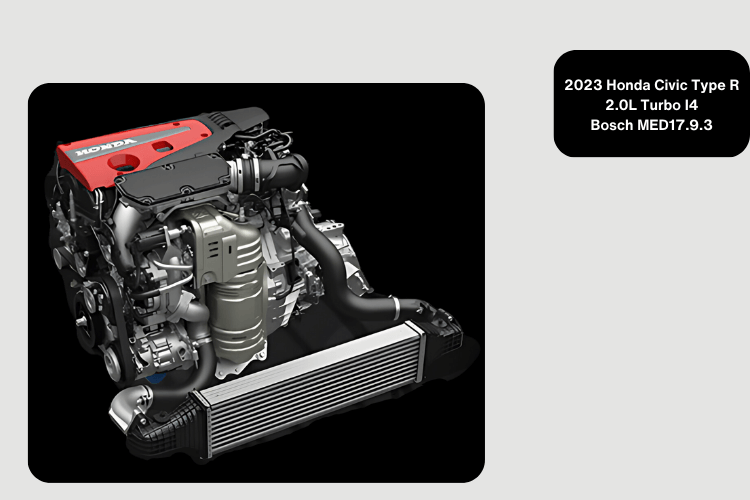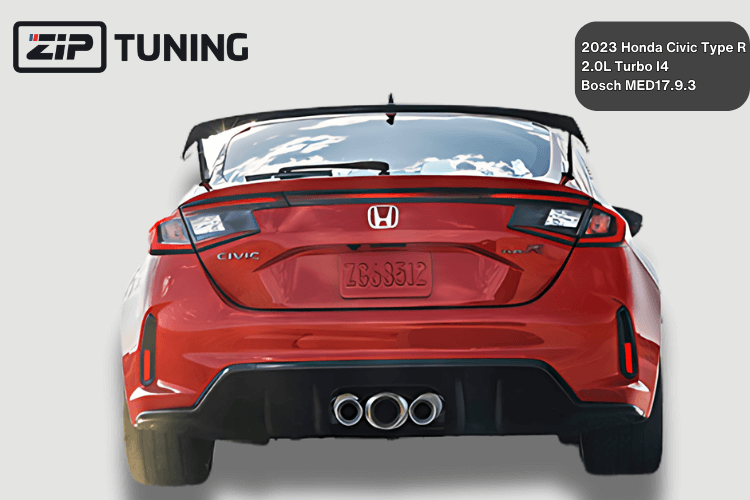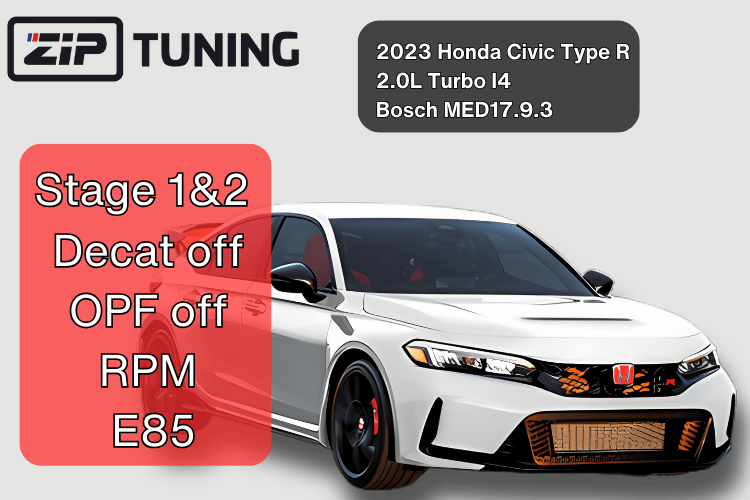ECU Tuning for the Honda Civic 2.0 Turbo: Unleashing Performance Potential
POSTED IN nieuws
The Honda Civic 2.0 Turbo, with its factory-rated 316 hp (235 kW) and 400 Nm (295 lb-ft) of torque, is an impressive platform for performance enthusiasts. This article delves into the intricacies of ECU tuning for this vehicle, exploring ZIPtuning's Stage 1 and Stage 2 options, as well as advanced modifications like decat, OPF deletion, and E85 calibration.
Stock Specifications and Tuning Potential
The stock Honda Civic 2.0 Turbo operates with a factory boost pressure of approximately 1.5 bar (21.8 psi). This conservative setting leaves significant room for performance gains through ECU tuning.
ZIPtuning's Stage 1 and Stage 2 ECU Tuning
Stage 1 Tuning
Our Stage 1 tune focuses on optimizing the stock hardware:
- Power increase: Approximately 40-50 hp and 60-70 Nm
- Boost pressure: Increased to 1.8 bar (26.1 psi)
- Fuel mapping: Enriched for optimal air-fuel ratio under higher boost
- Ignition timing: Advanced by 2-3 degrees across the rev range
- Turbo spool: Improved by adjusting wastegate control

Stage 2 Tuning
Stage 2 builds upon Stage 1, assuming minor hardware modifications:
- Power increase: Up to 70-80 hp and 90-100 Nm over stock
- Boost pressure: Pushed to 2.1 bar (30.5 psi)
- Fuel mapping: Further enriched to support increased airflow
- Ignition timing: Advanced up to 4-5 degrees, varying by RPM
- Turbo spool: Significantly improved with more aggressive wastegate control
Decat and OPF/GPF Deletion
Removing the catalytic converter and OPF/GPF offers several benefits:
- Reduced exhaust backpressure by up to 30%
- Improved exhaust flow, allowing for higher peak power
- Potential for more aggressive tuning due to lower EGTs
ECU adjustments for decat/OPF delete include:
- Recalibration of O2 sensor parameters
- Adjustment of exhaust flow calculations
- Fine-tuning of fuel trims to account for changed exhaust characteristics
E85 Calibration
E85 offers significant performance potential due to its higher octane rating and cooling effect:
- Stoichiometric ratio: 9.8:1 for E85 vs 14.7:1 for gasoline
- Fuel injector pulse width: Increased by approximately 30% to compensate for lower energy content
- Ignition timing: Advanced by up to 7-8 degrees compared to gasoline tune
- Cooling effect: Allows for higher boost pressures, typically 0.2-0.3 bar over gasoline tune

The cooling effect of E85 can be quantified using the formula:
ΔT = ( Mfuel*LHVfuel ) / ( Mair*Cp,air )
Where:
- ΔT is the temperature drop,
- mfuel is the mass of fuel injected,
- LHVfuel is the latent heat of vaporization of the fuel,
- mair is the mass of air, and
- cp,air is the specific heat capacity of air.
ZIPtuning's Development and Testing Process
Our tuning process involves:
- Baseline dyno testing to establish stock performance metrics
- Incremental adjustments to boost, fueling, and ignition parameters
- Extensive data logging, including:
- Air-fuel ratios across the rev range
- Ignition timing and knock sensor activity
- Turbo speed and boost pressure
- Exhaust gas temperatures
- Analysis of logged data using proprietary software to optimize performance while maintaining reliability
- Implementation of safety features such as boost cut-off at high IATs and fuel cut-off at dangerous AFRs
Comparison of Tuning Options
| Tune Type | Power Gain | Drivability | Risk Level |
|---|---|---|---|
| Stage 1 | Moderate | Excellent | Low |
| Stage 2 | High | Very Good | Moderate |
| E85 | Highest | Good | Higher |
Technical Tips for Tuners
When implementing our tunes:
- Always perform a thorough vehicle inspection before and after tuning
- Use high-quality fuel and ensure the fuel system is capable of supporting increased demand
- Monitor knock sensor activity closely during initial test drives
- Consider upgrading the intercooler for Stage 2 and E85 tunes to manage increased charge air temperatures
- Regularly check for updated calibrations, as we continually refine our tunes based on real-world data
By leveraging ZIPtuning's expertise in ECU calibration, tuners can unlock the full potential of the Honda Civic 2.0 Turbo while maintaining reliability and drivability. Our comprehensive approach to tuning, combined with rigorous testing and safety measures, ensures optimal performance across a range of modifications.


